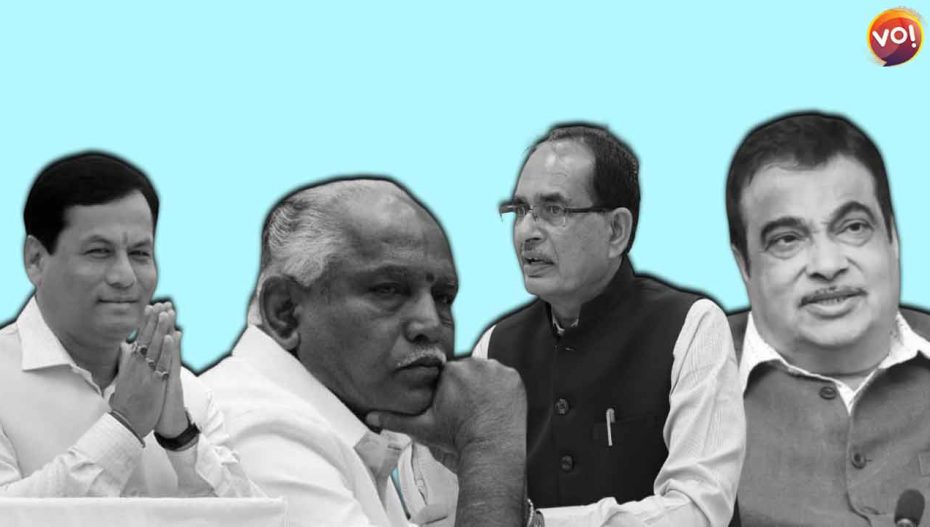At long last, the BJP reset its central parliamentary board as well as the central election committee, indicating Prime Minister Narendra Modi’s intent to straighten out the creases in certain poll-bound states as well as do the balancing act in some others.
The 11-member parliamentary board is the BJP’s apex-decision panel on political and organisational issues and is regarded as the party’s super elite committee. Nitin Gadkari, the former party president and now a central minister, was excluded from the board as was the Madhya Pradesh chief minister, Shivraj Singh Chouhan. Gadkari’s deletion raises a question mark over his future in electoral politics unless the RSS continues pitching for him.
Chouhan was inducted in 2014, bucking speculation that his prospects were waning in the Modi era. His exclusion may be related to another factor: the panel does not have a single CM, although Yogi Adityanath, the Uttar Pradesh chief minister’s name was buzzing around as a strong candidate.
On the other hand, a surprising inclusion was BS Yediyurappa, the former Karnataka CM, who was written off as a has-been after Basavaraj Bommai was instated in his place last year. Yediyurappa’s inclusion reinforces a perception that the “marg darshak mandal” is still not a home for the BJP’s seniors if they commanded a strong social base and a following in their states.
Karnataka goes to polls in May 2023. Its importance to the BJP derives from the fact that it is still the only southern state in its grasp. Lately, under Bommai, Karnataka transformed into another laboratory to test out the popular efficacy of Hindutva-related issues after Gujarat and UP. However, caste is as predominant, if not more, in the state than a pan religious identity. Yediyurappa maintains his position as the strongest leader of the Lingayat community that forms the backbone of the BJP. Although Bommai is also from the Lingayat caste—a major reason why he was cherry-picked from among a line-up of contenders—the BJP’s own assessment was he did not command a mass following. Indeed, the party lost by-elections in the constituencies where Bommai had campaigned vigorously.
Recently, when Karnataka was in the throes of a turmoil, caused by the murder of a BJP youth wing activist, Praveen Nettaru, in Dakshin Kannada, a communally charged district that is the BJP’s original bastion, Bommai was blamed for not “doing enough” for the “Hindutva cause”. BJP leaders who visited Nettaru’s village, Bellare, were attacked by the Sangh “parivar” cadre. The incident was a blow to the party. Home minister Amit Shah travelled to Bengaluru and especially met Yediyurappa over breakfast. The meeting sparked off speculation that rehabilitation was on the cards for the former CM. As a parliamentary board member, his inputs on aspects like candidates’ selection and campaign themes will matter to the others. Yediyurappa’s induction is also a heads-up to the Karnataka BJP’s other self-assumed heavyweights like Pralahad Joshi, Jagadish Shettar and KS Eshwarappa.
The other interesting selection is another former CM, Sarbananda Sonowal of Assam. The soft-spoken Sonowal, who is a central minister after Himanta Biswa Sarma replaced him, has reportedly been brought in to do a “balancing act” in the state which is the BJP’s gateway to the north-east. Sarma is the pivot around which the party’s north-eastern politics hinges because he is well networked in the entire region but there was a feeling that a “counterweight” to him was needed. Indeed, Sonowal’s induction is in keeping with Modi’s political style of not over-investing in a particular individual.
Since Telangana is regarded as the next sunrise state in the south, K Laxman, a former state BJP president who now heads the national OBC morcha, was also taken in the panel. Laxman, who belongs to the Munnuru Kapu backward caste (the BJP is tapping Telangana’s OBC castes), is a former ABVP activist.
The accent on backward castes and Dalits is evident from the fact that the other new members are the virtually forgotten Sudha Yadav and Satyanarayan Jatiya. Sudha, a former Lok Sabha MP from Haryana, also headed the OBC Morcha like Laxman once. She will form another piece in the complex mosaic of Haryana’s caste politics.
The references to Jatiya wrote him off as “retired”. Indeed, the seven-term Lok Sabha MP from Madhya Pradesh’s Ujjain, is essentially low-key and did one stint as a minister in Atal Bihari Vajpayee’s government. He is close to the RSS’s labour wing, the Bharatiya Mazdoor Sangh. Sudha and Jatiya’s nominations reflect on Modi’s propensity to go in for those who keep a low profile and do not display their ambitions.
The 16-member central election committee has all those on the parliamentary board with two significant additions: Devendra Fadnavis, the Maharashtra deputy CM and Om Mathur, an old hand from Rajasthan that goes to polls in November 2023. The other members are central minister Bhupendra Yadav, BL Santhosh, national general secretary (organisation)—who is also on the parliamentary board, and Vanathi Srinivasan from Tamil Nadu, who helms the women’s wing.












